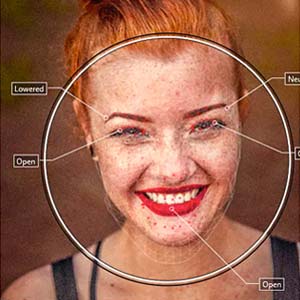Must-see TED Talks on emotions
Emotions are fundamental in understanding human behavior. Do you want to get a better understanding of emotions? We’ve put together a list of must-see TED Talks on emotions.
Posted by
Published on
Tue 26 Jul. 2022
Topics
| Action Units | Emotions | FaceReader | Measure Emotions | Measuring Behavior | Social Interaction |

We have written our fair share of blog posts about emotions, and what role they play in our daily life. Our face is often the best indicator for our emotional state, as our facial expressions can be observed by others and convey emotions without saying a word.
For researchers, emotions are fundamental in understanding human behavior, as they are a crucial part in non-verbal communication and a rich source of social signals.
6x Must-see TED Talks on emotions
Do you want a better understanding of emotions? We have put together a list of must-see TED Talks on emotions. Watch and learn!
Are there universal expressions of emotion?
Facial expressions are created with the help of muscle movements beneath the skin of the face. Back in the 60’s, the American psychologist Paul Ekman identified several core expressions, that we now identify as universal. These so-called universal expressions are: happiness, sadness, anger, fear, surprise, and disgust.
Since then, researchers have proposed additional mental states such as contempt, shame, and disapproval. These kind of mental states - or Custom Expressions - are essential in consumer research for instance, as they provide insights into user responses and buying behavior.
The concept of universal emotions
But do these expressions look the same and communicate the same meaning around the world, regardless of country and culture? Is one person's smile another's grimace? Sophie Zadeh investigates the concept of universal emotions in this TED-Ed, the youth and education initiative by TED.
Read this: SUKIPANI: The magic word for making a smile
Source: TED.com
Facial expression and emotion analysis with FaceReader
In FaceReader, the premier automated tool for facial expression analysis, you can define your own Custom Expressions by combining the facial expressions and Action Units. Whilst FaceReader is not capable of recognizing or identifying faces or people, it is the ideal tool for analyzing facial expressions and providing insights into emotional responses.
The history of human emotions
The words we use to describe our emotions affect how we feel, says cultural historian Tiffany Watt Smith, and they have often changed - sometimes very dramatically - in response to new cultural expectations and ideas. Take nostalgia, for instance: first defined in 1688 as an illness and even considered deadly. Nowadays it's seen as a much less serious ailment, and more of an emotion that many people sometimes experience.
And you’ve probably come across some untranslatable words for emotions that are used in specific cultures. Like ‘gezelligheid’, a Dutch word which is often used to describe a social and relaxed gathering with friends or family, and can be loosely translated as 'coziness', 'conviviality', or 'fun'. Or the German word ‘Schadenfreude’, used to describe the experience of pleasure, joy, or self-satisfaction when learning from or witnessing the troubles or failures of another.
In this TED Talk about the history of emotions, you learn more about how the language we use to describe how we feel continues to evolve. You might even pick up some new words used in different cultures to capture those feelings in words.
Source: TED.com
The role of human emotions in science and research
Do human emotions have a role to play in science and research? We tend to think that science is all about facts and logic; and human feelings are often neglected or considered an obstacle to get rid of as soon as possible. Material researcher Dr. Ilona Stengel suggests that instead of opposing each other, emotions and logic complement and reinforce each other.
She shares a personal case study on how properly using emotions can boost teamwork and personal development. And how an empowering feeling of being dedicated to something meaningful, can even be a catalyst for scientific breakthroughs and innovation.
Source: TED.com

“Emotions and logic do not oppose each other. They complement each other, and they reinforce each other.”
Dr. Ilona Stengel|Merck KGaA, Darmstadt, Germany
How your emotions change the shape of your heart
No other organ, perhaps no other object in human life, has been subjected to metaphor and meaning as the human heart. It’s the subject in many books, poems, movies, and songs since as long as we can remember. "A record of our emotional life is written on our hearts," says cardiologist and author Sandeep Jauhar.
In this TED Talk, he explores the mysterious ways our emotions impact the health of our hearts, our most vital organ. And how emotions can actually cause the heart to change shape in response to grief or fear, to literally break in response to emotional heartbreak.
Source: TED.com
How to embrace emotions at work
Some might say that emotions don't belong at work, and this often leads us to mistakenly associate professionalism with being stoic or even cold. But research shows that in the moments when colleagues or business relations drop their perfect professional presentation and share some real feelings, we're actually much more likely to believe what they're telling us.
Author and illustrator Liz Fosslien uses behavioral science to make work better. "You can't just flip a switch when you step into the office and turn your emotions off. Feeling feelings is part of being human," she says. She shares why selective vulnerability is the key to bringing your authentic self to work.
Source: TED.com
The hidden power of smiling
And last but not least: did you know your smile can be a predictor of how long you’ll live – and that a simple smile has a measurable effect on your overall well-being? Entrepreneur Ron Gutman reviews a number of studies about facial feedback and smiling, and reveals some surprising results.
Check out his TED Talk and learn more about and this evolutionarily contagious behavior.
Source: TED.com
You might want to read these articles too:
Related Posts

Validation-study: Basic emotions and Action Units detection

The relevance of emotions on the evaluation of a transactional website



